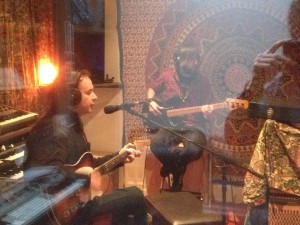The Importance of Correct Practice & Good Teachers
Over the last year during my studies with Joe Hubbard I learned a lot about how to practice, and the benefits of having a good teacher. Up until that point, even though I had got through a 4 year degree in jazz, I hadn’t really given enough consideration to my approach to practicing music. Joe helped me clarify a lot of things, and confirmed or disproved many thoughts and opinions I had. I’m a great believer in taking one to one lessons with a teacher if it is at all possible, and with the improvement in internet communication over the last few years, it is now possible to study with quality teachers from anywhere in the world.
Here, in my opinion, is why having a quality teacher is a good thing when learning music: they know more than you. Even if people tell you “You’re amazing at bass” or guitar, or whatever instrument you play, you can and should find a teacher who is better than you. They will definitely have knowledge to pass on and some of it you will not even know exists. Everyone, without exception, has more to learn than they already know. That’s why I still study and practice, and that’s why the best in the world still study and practice. The fact of life is that there will never be a point as a musician when you know everything, or even half of it probably.
It’s good to have the humility to admit you still have things to learn, even though you may have confidence in your own ability to play your instrument.
My Practice Ideas
Everyone develops their own practice routine and approaches, and the list below is merely my own opinion, but I believe there are some key concepts to making much more rapid progress when learning an instrument. Obviously, seeking guidance from a teacher is best, but here are some things for musicians of all ages and experiences to bear in mind:
- Break things down into small, manageable pieces. This is one of the most important things you can ever do. Then practice one small piece until it is PERFECT. I’m not talking just when learning pieces of music, either. The small chunk of information could be work on the left hand, right hand, the sound you get from your gear……..anything really, just be a perfectionist about each chunk.
- Embrace the fact that things don’t happen instantly, and these small pieces of information could take 5 minutes or 5 weeks to get right, and then even longer to be used in a real life context.
- Efficient practice methodologies are vital. By this, I mean taking a holistic approach to practice exercises, making exercises which work on multiple things at the same time. For example, playing one arpeggio can work on left hand, right hand, ear training, tone, fingerboard knowledge and theory all at the same time, if the concept for your approach is good.
- You should never just learn something for the sake of it, unless it is a means to an end. Ask yourself “What do I want to get out of this?” and even if it is just because you like it, that’s a great reason. Just consider how you will use what you learn once you are in other situations, to make the time spent on it worthwhile.
- Practice out of time first, to get your fingers around what you are trying to do. You will also learn how something sounds much more accurately when you can hear every note cleanly.
- The metronome is good for you, but only once you have practiced things slowly enough that they are flawless every time. Once that is done, then you can ramp up the speed with a metronome. Mistakes slowly will only get worse when you get faster.
- Listen to as many different types of music as possible, get your teacher to show you new music and ask what is happening in it and why. Then see what you can learn from it……every style of music will have new, beneficial things in for you.
- If you aren’t sure about any of this: GET A TEACHER WHO KNOWS ABOUT THIS STUFF. If you feel your teacher doesn’t: TRY ANOTHER ONE.
This is not a definitive list, and as my ideas evolve, so do my teaching methods and playing concepts. This list will be added to/edited as things evolve.
Is This Useful?
Many people will now be asking “Is this of any use to me, though?” as they may only like one genre of music, or not have the inclination to work that hard at it. What I would say is this: a good teacher will be able to link these concepts to any style the pupil is interested in, and it will make the pupil a better musician for it. Not only that, but with a good approach to practice you can actually learn more in less time, regardless of styles. At the end of the day, it’s all just music, and the underlying mechanics are the same whether you play blues, rock, jazz, pop, punk or anything else.
As far as I am concerned, knowledge is power, so learn as much as you can. The more you learn and the better you get, the more you will want to know. So get your head down the rabbit hole.

Comments
[...] better musician. Playing along with the record is also really important. It’s on YouTube and Spotify, so go check it out (and pay attention to Metheny and Roy Haynes, and what they do as [...]
Comments are closed.